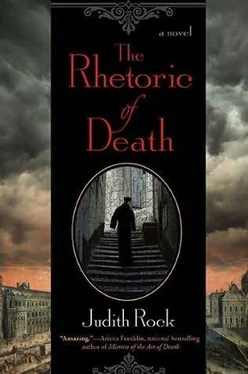Judith Rock - The Rhetoric of Death
Здесь есть возможность читать онлайн «Judith Rock - The Rhetoric of Death» весь текст электронной книги совершенно бесплатно (целиком полную версию без сокращений). В некоторых случаях можно слушать аудио, скачать через торрент в формате fb2 и присутствует краткое содержание. Жанр: Исторический детектив, на английском языке. Описание произведения, (предисловие) а так же отзывы посетителей доступны на портале библиотеки ЛибКат.
- Название:The Rhetoric of Death
- Автор:
- Жанр:
- Год:неизвестен
- ISBN:нет данных
- Рейтинг книги:3 / 5. Голосов: 1
-
Избранное:Добавить в избранное
- Отзывы:
-
Ваша оценка:
- 60
- 1
- 2
- 3
- 4
- 5
The Rhetoric of Death: краткое содержание, описание и аннотация
Предлагаем к чтению аннотацию, описание, краткое содержание или предисловие (зависит от того, что написал сам автор книги «The Rhetoric of Death»). Если вы не нашли необходимую информацию о книге — напишите в комментариях, мы постараемся отыскать её.
The Rhetoric of Death — читать онлайн бесплатно полную книгу (весь текст) целиком
Ниже представлен текст книги, разбитый по страницам. Система сохранения места последней прочитанной страницы, позволяет с удобством читать онлайн бесплатно книгу «The Rhetoric of Death», без необходимости каждый раз заново искать на чём Вы остановились. Поставьте закладку, и сможете в любой момент перейти на страницу, на которой закончили чтение.
Интервал:
Закладка:
At the foot of the ladder, Jouvancy and Beauchamps were still muttering furiously at each other. Except for de Lille, who was happily and obliviously practicing graceful little jumps, the college was dangerously on edge. Too many were relishing Guise’s titillating insinuations and looking sideways at Charles. Jouvancy, by all accounts usually the mildest and best loved of teachers, was grieving and exhausted, his temper shorter than Charles’s thumb. Half the students were also grieving for Philippe, while the other half were pleasurably frightened over who might be next.
Beauchamps, whose mind was not on Philippe at all, turned abruptly from Jouvancy, ordered de Lille back to earth, and led him away to the windows, pouring a stream of instruction into his ear. Jouvancy snorted in disgust and pushed the remains of the offending sugar cone and its plate toward Charles with a disdainful toe.
“Take this-this”-Jouvancy clamped his lips together and tried again-“sugar to the lay brothers’ kitchen. At least they can get some good out of it.”
“Now?” Charles said.
“Of course now!”
Jouvancy stalked back to the silent Clovis cast, who stood huddled together like a flock of anxious sheep. Charles, thankful to escape the charged atmosphere, picked up the plate and held it out to the two sugar scrapers, who eagerly took last pinches of sweetness. Everyone needed whatever small comfort he could get just now.
The lay brothers’ kitchen and refectory were in the same courtyard as the outdoor latrine and next to the stable court. If he was quick about his errand, he might be able to settle another question about Antoine’s “accident.” He hurried through the archway between the courtyards, toward the kitchen and the savory smell drifting from its open door. Startling a flutter of sparrows away from a crust of bread, he poked his head into the big room, where a cauldron bubbling in the huge fireplace poured steam into the oven-hot air. Two red-faced brothers with their cassock sleeves folded back to their shoulders were slicing bread at a scarred table, while another brother, whose age had spread an old-fashioned tonsure over most of his freckled scalp, piled peaches onto a tray.
“Trust me, maitre, you don’t want to come into our nice little hell here,” the old man called to Charles.
“Not this or any other hell, I hope, mon frere!” Charles held out the plate. “Can you use some sugar?”
“But yes, of course, always!” He wiped his sticky hands down his canvas apron and came to the door. “Where did you get it?”
“It was meant for snow. But now Pere Jouvancy says it’s too brown.”
The old brother laughed heartily as he took the plate. “Yes, we usually get a good bit of his snow. Very picky about snow, Pere Jouvancy is. We could use some real snow in here today, I’ll tell you!”
Still laughing, he went back to his peaches. Charles turned toward the stable court and nearly collided with another lay brother, who danced aside, grinning, and stuck his head inside the kitchen.
“Frere Tricot, one more little one! Come on, mon frere, you have Lady Automne’s cornucopia there-and it’s not even quite August yet!”
A peach flew out the door. The newcomer caught it, nodding enthusiastically, and held up his other hand. A growl from the kitchen followed another peach through the air. The brother caught it, bit into it, and turned to Charles, who had stopped to watch.
“We should always admire the abundance of the bon Dieu,” the brother said around his bulging mouthful. “Should we not?”
“Nice to be able to accommodate so much of the abundance at once,” Charles laughed.
“Ah, I must stretch to it, whenever Lady Abundance deigns to visit me.” He dropped the second peach into his apron pocket. “She’s a woman, after all, and they always turn on you in the end, don’t they?”
“Do they?”
“Mine do.”
“Do?” Charles looked pointedly at the short cassock under the man’s canvas apron and then added hypocrisy to his mental list of sins for his next confession. Who was he these days to admonish anyone for thinking about women?
“Oh dear, what is wrong with my tongue? Did turn on me, I mean, in my far distant past!”The brother’s sapphire eyes danced like light on water as he held out his cassock skirt. “But even leaving this aside-and leaving women sadly aside-I suppose I should never predict what anyone will do. Mere sinful men are forbidden to predict the future, are we not?”
Standing at ease, he finished his peach and looked Charles over. Charles was visited by a vision of this wiry, taut-muscled man-who seemed neither to know his place nor care about keeping it-wearing velvet in a grand salon, appraising the company and finding it wanting.
“What is your name, mon frere?” Charles said, realizing suddenly that he’d seen the man before. “I saw you juggling in the Cour d’honneur on my first day here.”
The brother sketched Charles an ironic bow. “Ah, my one poor talent. I am Frere Moulin, maitre.” He made an ironic fuss of straightening the regulation high shirt collar just showing above his cassock.
He took three peaches from his apron pocket and began to juggle, spinning them into a golden blur. Charles watched, enjoying the man’s skill and thinking that his speech and manner-and juggling, for that matter-consorted ill with the apron and cassock. Lay brothers were the Society’s servants, mostly peasants or the sons of poor artisans, as Frere Fabre was. Charles thought that he would eat juggling balls before he’d believe that this Moulin sprang from a peasant’s cottage.
“Very impressive, mon frere,” he said. “I am Maitre Charles du Luc, newly come from Carpentras to teach rhetoric.”
“I know.” Moulin sent the peaches fountaining higher, spilling their fragrance into the air. “I have heard all about you.” He tossed a peach at Charles and caught the other two in one hand.
“All?” Charles plucked the peach out of the air and bit into its warm succulence. “Only the bon Dieu knows all, Frere Moulin.”
“Alas, too true. Rest assured I will be confessing arrogance next time I go to my confessor. Too true, indeed. ‘No man knows even the day or the hour,’ so it says in Holy Scripture. But the real truth is, no man knows anything worth a piss. Least of all me.” He fixed Charles with a look like a strike of blue lightning and his voice went flat. “Or you.”
Then the easy brilliance was back, and with a wide smile and a bow that would have done Versailles credit, Moulin disappeared toward the stable. Charles swallowed the last of the peach and followed. Except for doves pecking around the well, the stable court was empty. Charles stopped in the stable’s broad entrance, gazing at the straw-strewn floor and listening to the horse noises-tails switching to keep off flies, soft snorts, the occasional stamp of a hoof, and high-pitched swearing. His eyebrows lifted and he peered into the dimness redolent of hay and dung and leather. No horse he’d ever known swore.
The three stalls on his left were empty. A restless black horse in the first stall on the right thrust its nose over the half door and pricked its ears at him. The next stall was untenanted, but in the third, a stocky little figure astride a placid dappled gray swore steadily as she struggled to kilt her rough brown skirts and blue petticoat above her knees. Her bare legs and feet stuck nearly straight out from the gray’s broad back.
“Bon jour, mademoiselle.” Charles leaned his arms on the stall’s half door. “Where are you riding to today?”
Marie-Ange gave a last tug at her skirts and brandished a wooden sword at him, scowling anxiously. “I am Jeanne d’Arc, going to kill the English! Do not get in my way!”
Читать дальшеИнтервал:
Закладка:
Похожие книги на «The Rhetoric of Death»
Представляем Вашему вниманию похожие книги на «The Rhetoric of Death» списком для выбора. Мы отобрали схожую по названию и смыслу литературу в надежде предоставить читателям больше вариантов отыскать новые, интересные, ещё непрочитанные произведения.
Обсуждение, отзывы о книге «The Rhetoric of Death» и просто собственные мнения читателей. Оставьте ваши комментарии, напишите, что Вы думаете о произведении, его смысле или главных героях. Укажите что конкретно понравилось, а что нет, и почему Вы так считаете.












